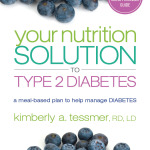Diet Tips For People Over 50
By Kimberly A. Tessmer, RDN, LD
For those over 55 years old diet and health seem to become more of a priority than in our younger years. Risks for certain health conditions including type 2 diabetes, certain types of cancers, osteoporosis and heart disease raise dramatically so it is more important than ever to be aware of what you eat and to make positive lifestyle changes.
Here are a few diet tips to help keep you in tip-top shape:
►Eat a variety of colorful fruits and vegetables at every meal
The more variety you add to your day the better your nutritional intake. The antioxidants that are found in fruits and vegetables help to stop the damage of healthy cells. There are all types of antioxidants that do everything from protecting your vision from macular degeneration to lowering your risk for certain cancers, heart disease and premature aging to keeping your skin younger looking. Make it a goal to fill half of your plate with fruits and vegetables and strive for at least five to nine servings each day.
►Eat plenty of whole-grains
Choose foods that contain whole grains and therefore are rich in fiber such as oats, oatmeal, quinoa, barley, whole-wheat breads/crackers, whole-grain cereals, whole-grain couscous, brown rice, wild rice and popcorn. Including plenty of these foods daily can help to lower your chances of developing type 2 diabetes, keep your blood vessels in peak condition, lower your total cholesterol levels (especially the “bad” cholesterol), promote regularity, and lower your risk for certain cancers. Shoot for at least three servings, if not more, of whole grains daily.
►Include fish and seafood weekly
Fish and seafood are chock full of omega-3 fatty acids that offer loads of anti-aging benefits. Including fish and seafood in your weekly diet, especially those high in omega-3 fatty acids such as salmon, albacore tuna, rainbow trout, Atlantic mackerel, Pacific halibut, sardines, anchovies, oysters, and mussels can protect your heart, lower your risk of experiencing a stroke, help to alleviate joint pain, and even may help guard against Alzheimer’s disease and depression. Include at least two to three servings a week of these fatty fish/seafood. Be aware that some fish have higher levels of mercury and should be restricted to no more than 7 ounces per week including swordfish, tilefish, shark and king mackerel. If you do not care for fish, speak with your doctor first before considering fish oil supplements.
►Don’t forget to include dairy foods
Just because you are not a kid anymore does not mean you don’t need to drink your milk! The calcium and vitamin D that milk and other dairy foods provide are crucial to keeping bones strong and avoiding osteoporosis. Choose fat-free or low-fat versions of dairy products to keep cholesterol levels in check. Try to include at least 3 cups of dairy foods per day and if lactose is a problem try soymilk, almond milk, yogurts or lactose-free milk that are fortified with calcium and vitamin D.
►Add non-meat sources of protein weekly
Meat is not the only way to get your protein daily. Foods such as nuts, seeds, soy foods, legumes and beans are a great way to get plant-based protein and fiber as well. They can be an age-protecting alternative to red meats that tend to contain cholesterol and unhealthy saturated fats. It is also a great way to add variety and taste to your everyday meals.
In addition to diet, lifestyle changes are just as important for keeping you feeling your best. Getting plenty of exercise, sleep, and stress-relief are vital as well as not smoking and moderating your alcohol intake. The better you take care of your body, mind and spirit the better your chances of staying health, feeling good and living a longer and healthier life.
Category: Blog




































